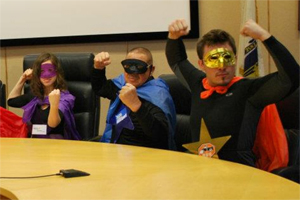The unique and brilliant Boston.
I spent a considerable portion of last year with Occupy Boston, back when they held Dewey Square by South Station. Throughout the Occupy movement, be it in Boston, or NY, Philly, Chicago, Miami, etc...an interesting game was played between existing PACs, unions and other community and political groups and the various factions which comprise the Occupy OWS movement.
Partally attempts at cooption, partially legitimate efforts to build coalitions, various locals and various groups varied in their approaches. Through old SEIU and PAC contacts as well as activist friends throughout the country, I kept up on the ongoings throughout the camps and regions. In New York, real cooption was impossible as it stood proud as the beating heart of a growing, truly populist movement. In Philly and Chicago, relations were forged with paid internships being sold to resident Occupiers to serve as internal organizers for SEIU and material/financial support for the camps, so as to use their newly created blocs to aid in their Fight For a Fair Economy (FFFE) electoral campaign.
This did not always work out the way the union may have wanted, as much to SEIU chagrin, motions were passed in the Chicago GA for Occupy Chicago to march on and attempt an occupation of Mayor Rahm Emmanuel's office. With their (SEIU's) growing investment in the Obama campaign and the diversion of so much of their international organizing budget being dedicated to winning his reelection, its reasonable to assume a move against one of his closest allies wouldn't be something they'd be over the moon about. However in Boston, a curiousity...
Perhaps it was the nature of the camp or the relationship between the factions and activists there. Maybe it was the strength and pride taken in the General Assembly process, held in a city widely regarded as the birthplace of American democracy. Or perhaps it was just that Boston attitude wherein no one can TELL you what to do or SELL you on what to think, but whatever the cause, Occupy Boston and its growing affiliated network of SEIU and AFL locals, progressive issue PACs, social and community groups grew into something of a cohesive, unified movement, without further attempts at cooption or influence by any.
Actions taken under the banner of Occupy Boston were uniformly GA approved and ratified through genuine consensus. Recognizing that their autonomy was as precious as their solidarity, Occupy Boston remains not only a functioning and vital part of the greater movement, but a solid and equal partner to organized labor as a whole. And since the loss of Dewey Square, their devotion to this truly populist cause and the support they offer their allies, stands as a testiment to the true necessity for working people to have a voice in how their country and city operate.







